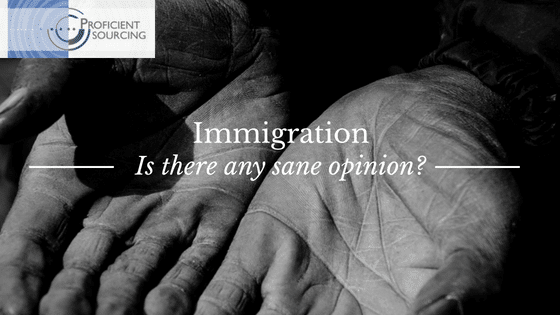
After reading yet another rant on this subject, we think some commentary might be appropriate. We’ll take a break from supplier-buyer issues this edition.
Over the past year or two, we’ve all been subjected to noisy comments on sanctuary cities, refugees, amnesty, path to citizenship, family separation, DACA, border walls, chain migration, open borders, and who knows how many other subjects related to immigration. It appears we are expected to consider each of these subjects as some sort of independent item, rather than a consequence of our current leader’s actions (or lack thereof).
The extremes are open borders, with no restriction on who comes into the country on one side, and no immigration on the other. Surely there’s a good plan somewhere between these poles. Does anyone know of anyone who has tried to connect even most of these “dots”?
Let’s start with this: most reasonable people seem to agree that some immigration is necessary for economic health. Here’s one justification comment from this NPR link.
“The general fertility rate sank to a record low of 60.2 births per 1,000 women between the ages of 15 and 44 — a 3 percent drop from 2016, the CDC said in its tally of provisional data for the year. The results put the U.S. further away from a viable replacement rate – the standard for a generation being able to replicate its numbers. “The rate has generally been below replacement since 1971,” according to the report from CDC’s National Center for Health Statistics”.
So apparently maintaining replacement needs some level of immigration. The question becomes how many and who. And this appears to be a decision our elected representatives cannot deal with. As a result, we have chaos.
Does it make sense to have some control over who comes into the country? We think so. For one, some of you may be in companies looking for qualified workers, and having a flow of healthy people interested in working in manufacturing might be useful. Directing them to places with employers in need might also be possible if we had a government interested in actually helping manufacturing. Similar actions could be created for any number of disciplines.
On the other hand, exerting no control over people likely to become welfare cases might be something to avoid. Or people attempting to enter the country with no ability to determine their backgrounds.
Surely, the country might consider some bounds concerning refugees from any number of sources. A rational central authority ought to be able to create rational rules along with the ability to adjust as the situation dictates.
Does it make any sense having political entities battle one another over the enforcement of federal laws concerning immigrants? Does the concept of sanctuary cities battling the federal government sound like effective government or a waste of resources? The concept may have some worthwhile aspects, but can we as a country tolerate political entities deciding which laws to follow and which to not?
We have just begun to describe the various aspects of the immigration issue. But our opinion is simply this: if the Congress would just do their job and create some rational laws, most of this would disappear. Not that complaints would end, but we would then have a structure for further action, instead of the current chaos.
What do you think?

